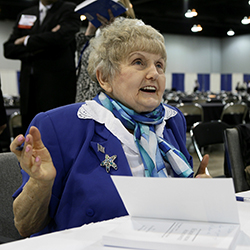Eva Mozes Kor, a survivor of Nazi experiments conducted on twins by Dr. Josef Mengele during World War II and a memorable two-time speaker on the importance of medical research ethics at ACRP annual meetings, passed away last week peacefully at the age of 85 during a trip to the concentration camp from which she had been liberated in 1945.
“[I] have learned that human rights and human experimentation is an issue that needs to be addressed and taught,” Kor told attendees during her moving plenary session talk on “Ethics in Medicine and Research: Lessons from Dr. Mengele” at the ACRP 2009 meeting in Denver, Colo.
Kor described how, when she was 10 in 1944, she and her family were taken from Rumania to the Auschwitz Concentration Camp. At the camp, she was separated from her parents and older sisters, whom she never saw again, but she and her twin sister, Miriam, were selected to be unwilling subjects of genetic experiments among some 1,500 other sets of twins.
After having a variety of unknown substances tested upon them, and following the liberation of the camp by the Russians, the sisters went to live with an aunt and then relocated to Israel in 1950. Kor later married an American tourist, Michael Kor, also a concentration camp survivor, and came to the United States. Her sister died in the 1990s, and as Kor struggled with the memories of what they had survived together, she founded CANDLES (Children of Auschwitz Nazi Deadly Lab Experiments Survivors), an organization devoted to twins who had experiences like her own. She later opened the CANDLES Holocaust Museum and Education Center in Terre Haute, Ind.
“Those of you who are physicians and scientists are to be congratulated,” Kor said in 2009. “You have chosen a wonderful profession; wonderful, because you can save human life, and difficult, because you are walking a very narrow line. You have been trained to use good judgment and clear logic, but you cannot forget that you are dealing with human beings. The moment you forget, and you cross that narrow line, you are heading in the direction of the Josef Mengeles. Every time you [are] involved in human experimentation, you should put yourself in the place of your subject and see how you would feel. [You] must remember that the research is done for the sake of mankind, and not for the sake of science.”
Kor returned as a speaker for the ACRP 2010 meeting in Tampa, Fla., where she said “Nothing on the face of this Earth can prepare a person for a place like Auschwitz. …We had no rights, but we had a fierce determination to live one more day, to survive one more experiment. …We knew we were there to be human guinea pigs. …Medical science can benefit mankind, but it can also be greatly abused. …You must never detach yourself from the subjects you serve.”
Author: Gary Cramer



